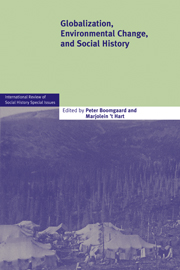Book contents
- Frontmatter
- Contents
- Notes on Contributors
- Globalization, Environmental Change, and Social History: An Introduction
- The El Dorado of Forestry: The Eucalyptus in India, South Africa, and Thailand, 1850–2000
- The Mid-Atlantic Islands: A Theatre of Early Modern Ecocide?
- Environmental Change and Globalization in Seventeenth-Century France: Dutch Traders and the Draining of French Wetlands (Arles, Petit Poitou)
- The Colonial Famine Plot: Slavery, Free Trade, and Empire in the French Atlantic, 1763–1791
- Environmental Changes, the Emergence of a Fuel Market, and the Working Conditions of Salt Makers in Bengal, c. 1780–1845
- Industrial Life in a Limiting Landscape: An Environmental Interpretation of Stalinist Social Conditions in the Far North
- “Pumpkins Just Got in There”: Gender and Generational Conflict and “Improved” Agriculture in Colonial Zimbabwe
- Hydro-businesses: National and Global Demands on the São Francisco River Basin Environment of Brazil
- Bibliography
The Mid-Atlantic Islands: A Theatre of Early Modern Ecocide?
Published online by Cambridge University Press: 05 June 2012
- Frontmatter
- Contents
- Notes on Contributors
- Globalization, Environmental Change, and Social History: An Introduction
- The El Dorado of Forestry: The Eucalyptus in India, South Africa, and Thailand, 1850–2000
- The Mid-Atlantic Islands: A Theatre of Early Modern Ecocide?
- Environmental Change and Globalization in Seventeenth-Century France: Dutch Traders and the Draining of French Wetlands (Arles, Petit Poitou)
- The Colonial Famine Plot: Slavery, Free Trade, and Empire in the French Atlantic, 1763–1791
- Environmental Changes, the Emergence of a Fuel Market, and the Working Conditions of Salt Makers in Bengal, c. 1780–1845
- Industrial Life in a Limiting Landscape: An Environmental Interpretation of Stalinist Social Conditions in the Far North
- “Pumpkins Just Got in There”: Gender and Generational Conflict and “Improved” Agriculture in Colonial Zimbabwe
- Hydro-businesses: National and Global Demands on the São Francisco River Basin Environment of Brazil
- Bibliography
Summary
Summary: The Iberian rediscovery of the mid-Atlantic islands in the late Middle Ages was accompanied by all kinds of utopian projections. However, within a hundred years, both human and animal populations were made extinct, and the rich forest cover was rapidly depleted for cash-cropping industries, primarily sugar. Historians view the migration of the international sugar industry from the mid-Atlantic islands to Brazil as an example of expanding economies of scale, but contemporary accounts indicate what now might be called widespread ecocide as a major contributing factor. This essay looks at the environmental ramifications of the sugar industry as well as other cultures, and assesses whether it is indeed appropriate to speak of ecocide in the context of the mid-Atlantic islands in the early modern period.
The neologism “ecocide” can be used to refer to any large-scale destruction of the natural environment, though the context into which the term was born turned on the catastrophic consequences to the environment unleashed by the Vietnam War with its extensive use of napalm. While the war moved Jean-Paul Sartre famously to equate colonialism with genocide, commentators quickly extended his declaration to ecocide. Ecocide became a primary accusation in the ongoing political struggle of the native North American Indians against petrochemical companies since 1978.
- Type
- Chapter
- Information
- Globalization, Environmental Change, and Social History , pp. 51 - 78Publisher: Cambridge University PressPrint publication year: 2011



